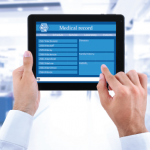Documentation Tools: These most often exist as forms and templates that assist in the documentation of care. These can include patient self-assessment forms, nursing patient assessment forms, clinician encounter documentation forms, and data flow sheets. These forms support decision making by ensuring that proper information is assessed and documented.
Order Creation Facilitators: These include CPOE and e-prescribing and add value to the practice by making the right thing easy to do. These systems help to ensure that correct orders are submitted in the right format, containing the right information, and that appropriate follow-up actions are triggered. These systems can help to streamline practice efficiency in addition to supporting best practices.
Protocol and Pathway Support: These tools can assist providers in monitoring and tracking patients who require care over an extended period. This type of CDS provides an easy—typically computerized—way to track progress and ensure that treatment steps are executed in the appropriate sequence.
Reference Information and Guidance: The rate at which medical practice is evolving and new therapies are being tested make it nearly impossible for busy physicians to keep up with the latest published literature. CDS in the form of filtered reference information and guidance can help to deliver pertinent, patient-specific information at the appropriate time in most useful format.
Reactive Alerts and Reminders: These are the most commonly thought of as forms of decision-support interventions. They are typically triggered by key information in a patient’s background or clinical data and provide active and immediate notification to providers regarding potential danger.
Clinical decision support tools can help you to ensure that the highest quality of care is delivered to your patients, but in the end, it is simply a tool and not a replacement for physician knowledge, experience, and leadership.
As you move forward in implementing CDS interventions in your practice, begin with the end in mind. What is it that you want to achieve, and what is the most effective way to get your team on board with the plan? Clinical decision support encourages the provision of better and higher quality care, but it is still up to each individual healthcare professional to do the right thing at the right time. If you have questions about CDS, contact Itara Barnes at [email protected].
Practice Support on the Web
Running a rheumatology practice takes a mix of medical and business knowledge, and the ACR has online tools to support both sides of your practice. By visiting www.rheumatology.org/practice, you can access tools for clinical support (such as patient fact sheets, practice guidelines, positions statements, the Rheumatology Clinical Registry, and standards of practice for rheumatology health professionals) and office support (such as patient documentation forms, coding resources, and information about the Medicare Physician Quality Reporting Initiative, health information technology, insurance, and legal and compliance). While you are there, you can also keep up with the most current practice issues and learn more about how the ACR is working to support your practice. Visit the ACR Web site today to access the tools you need to run your practice more efficiently. If you have specific questions about practice management, contact the ACR at (404) 633-3777.


